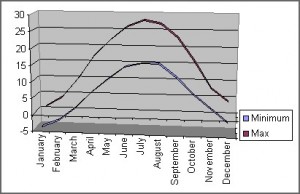Hungary has a continental climate, with cold, cloudy, humid winters and warm to hot summers. It is normally not much snow in Budapest, only a couple of days every year. In the winter the temperature has an average of around 0 and -5 °C. The spring comes early and is followed by a long summer. In the summer of 2007, Hungary had almost two weeks where the temperature changed between 35 and 40 °C. On average it is between 27 and 35 in the summer. The autumn lasts until November, and then it normally gets colder and the temperature is between 0 and 8 °C.
Since the climate is hard to predict, you should definitely look at the weather forecast before you travel to Budapest. But, if you would like to learn more about the average temperatures in the Hungarian capital, take a look at the table below.

Average temperatures in Budapest (in Celsius/Fahrenheit)
| Minimum | Maximum | |
| January | -4 (24.8 F) | 1 (33.8 F) |
| February | -2 (28.4 F) | 4 (39.2 F) |
| March | 2 (35.6 F) | 10 (50 F) |
| April | 7 (44.6 F) | 17 (62.6 F) |
| May | 11 (51.8 F) | 22 (71.6 F) |
| June | 15 (59 F) | 26 (78.8 F) |
| July | 16 (60.8 F) | 28 (82.4 F) |
| August | 16 (60.8 F) | 27 (80.6 F) |
| September | 12 (53.6 F) | 23 (73.4 F) |
| October | 7 (44.6 F) | 16 (60.8 F) |
| November | 3 (37.4 F) | 8 (46.4 F) |
| December | -1 (30.2 F) | 4 (39.2 F) |
A graph showing the average temperatures in Budapest

The weather in Budapest right now!
Below you can see what the weather is like in Budapest right now and also a forecast for the coming days.
Does it get too hot in Budapest in the summer?
Are you worried about it getting too hot in Budapest in the summer? You are not alone in that! Lots of people travel elsewhere in July and August, instead of visiting Budapest. It feels better to experience 35 Celsius while swimming in the Adriatic sea, or at least in Lake Balaton.
To be honest, on those hot summer days, it gets very warm in Budapest, maybe too warm. Luckily, all restaurants and hotels have air conditioning which will give you some fresh air in the midst of the heat. If you walk along the Danube you can almost always feel a breeze which also helps you on the warmest summer days.
Still, if you have heart trouble or have trouble enjoying yourself when the temperatures remain above 30 Celsius all day and don’t go below 20 Celsius at night, then you might want to travel elsewhere in the middle of the summer.